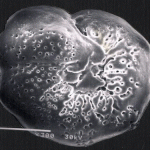
HIV cells in the bloodstream. Image: Shutterstock
HIV is a slippery customer, but it’s being forced to change.
Researchers from the University of Melbourne have discovered that HIV evolves to evade or escape the antibodies attacking it. But every time it changes, it becomes weaker.
Professor Stephen Kent says “The virus has an error-prone mechanism of replication so every time it replicates it throws up variants. Most of these are weaker and die out, but occasionally one will pop up that can no longer be recognised by an immune response, in this case ADCC antibodies.”
The research team, led by Professor Kent and Dr Ivan Stratov, investigated the human antibodies ADCC in patients with HIV. Professor Kent says that ADCC antibodies have been implicated before in vaccine trials, but their actions were poorly understood.
“The discovery tells us that the HIV virus does not like ADCC antibodies attacking it ““ they force the virus to evolve away from them. This usually makes the virus at least a little bit weaker.
“It also tells us that if the (ADCC) antibodies were there before people got infected with HIV, they could stop the infection taking hold.”
By using an assay developed in the lab, the research team were able to measure the ability of the ADCC antibodies to activate Natural Killer (NK) cells. This enabled them to determine where the antibodies are attacking HIV and how the virus has evolved over time to escape this.
“We use a flow cytometer to accurately measure whether the NK cells are trying to kill virus infected cells,” Professor Kent explains. “For this assay, unlike other ADCC assays, we can use small parts of the virus (short peptides) to assess what parts of the virus are inducing ADCC antibodies.”
“First we use large pools of 100s of peptides, then when we get a “hit” we narrow it down to single peptides. This allows us to define exactly where in the virus the ADCC antibodies are attacking.”
The team are now working on designing vaccines to induce ADCC antibodies, which will make it harder for the virus to escape. But according to Professor Kent “a HIV vaccine will be at least 10 years away, even if everything goes well. The human testing of vaccines and then the manufacture at large scale takes quite some time unfortunately.”






